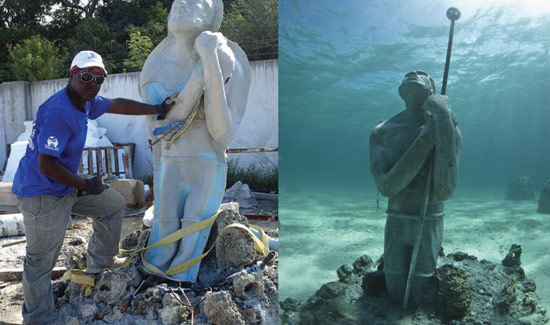 A problem, which has long become a concern for the government of The Bahamas, persisted this weekend, as Grand Bahama experienced yet another oil spill this past weekend.
A problem, which has long become a concern for the government of The Bahamas, persisted this weekend, as Grand Bahama experienced yet another oil spill this past weekend.
The Bahamas Oil Refining Company (BORCO) issued a press statement about a spill on Saturday, which came on the heels of the Government’s release on Friday; both in the Pinders Point area.
According to the Government’s release on Friday March 22, at 6 pm BORCO reported an oil spill in waters in the area of Pinder’s Point.
The release said the Port Department responded immediately and discovered what appeared to be a small quantity of oil covering an area of about 70 feet on rocks at a breakwater in the area of BORCO’s pipelines, that connect with a jetty.
This is the same area of the last sighting of an oil spill which occured in February of this year. The source of that last oil spill has to date not been determined.
“The area affected was boomed off and any additional oil was expected to be corralled in the area of the breakwater and retrieved from the water and the affected rocks will be cleaned,” said the release.
“Because of a forecasted deterioration of weather conditions over the next few days, however, it was not expected that divers could safely submerge before Tuesday to further investigate the source of the leak.
“The Port department will conduct a flyover of the general area tomorrow (Saturday).”
However, in the release from BORCO, they said they were also continuing investigations in the February 16 oil spill and had hired divers to inspect the vicinity of Pinder’s Point.
However, late Saturday, while divers were inspecting marine growth and debris surrounding the terminal’s cooling water effluent line, a volume of less than two gallons of oil was also said to have been dislodged.
The release said that BORCO’s emergency crews immediately responded, recovered the oil, and notifications were made to the appropriate Government agencies.
“The terminal’s cooling water effluent line has been isolated on site to allow BORCO to further investigate this possible source of last month’s release” the release continued.
They said that there is currently no oil in the water and that all on-water response equipment has been removed and decontaminated.
It stated that personnel continue to clean rocks along the shoreline and, weather permitting, expect to complete this work as soon as possible. BORCO is coordinating closely with the appropriate Government agencies as part of their ongoing investigation of the release.
“BORCO and its employees are an integral part of the local community in which we operate” said the release. “Our primary concerns are ensuring the safety of the public and responders as well as minimizing environmental impact.”
The Government release said that while this appears to be an incident involving a small amount of oil, the Ministry is very concerned about the occurrence of yet another emission of oil in Bahamian waters, particularly having regard to the possible impact on the quality of life of residents in the Pinder’s Point area.
The Ministry, it said is currently reviewing the Emergency Management Plan of BORCO, which was submitted since the last incident, but due to this recurrence will urgently seek to engage senior officials of BORCO in a meeting with relevant Government agencies relative to its operations.
It concluded that the situation will be closely monitored by the Port Department.
All this took place after three oil spills were reported in Grand Bahama between December 2012 and February 2013. According to the Member of Parliament for Central Grand Bahama Neko Grant, former Minister of Works, this was said to be cause for concern.
In a statement in February Grant said he is deeply concerned about the recent oil spills and calls on the government to be more proactive and informative.
Back in December 2012, there was an oil spill at the Lucayan Harbour when heavy crude oil was discovered leaking from the hull of the MSC Eugenia as it headed out to sea from the Freeport Container Port around 4 a.m. on December 3.
The ship was said to be en route to Port Everglades with more than 2,000 containers and 3,000 barrels of oil on-board when the captain and crew noticed the oil seeping out into the water.
According to reports the ship was not being penalized, unless the Attorney General’s Department could show that assessments have been ascertained to attribute environmental damage resulted from the oil spill.
In January of this year another oil spill was said to have affected the southern shores of Freeport and reports were that at approximately 5:06 a.m, on Sunday January 20, the MT Butterfly was moored at BORCO’s Jetty No. 8 receiving bunker (diesel fuel) from the bunker barge Smit Inesita, when sometime thereafter oil was discharged into the marine environment. The discharge was said to have fallen into the water between the tanker and the barge. It was reported that approximately 210 gallons of diesel oil was discharged into the water.
Then in February following the spill on the 16th, the Minister of Transport and Aviation Minister, Glenys Hanna-Martin visited BORCO to talk about the recent series of spills.
Reports said that Minister Hanna-Martin was keen to point out that while the government welcomes industry, she said that it must strike a balance between the protection of the industry’s business interests and the country’s marine environment.
Continuing in her press statement she informed all that her team discussed with the industry partners her Ministry’s plans to review the existing regulatory regime to ensure that the current legislation governing the petroleum industry is sufficiently astute to deal with that kind of operation in the country.
Activist and attorney Fred Smith issued a statement in February stating, “The Bahamas is in critical and dire need of an Environmental Protection Act. This legislation has been promised in the past by both the FNM and PLP governments.
“As The Bahamas broadens its industrial investment profile; encourages large scale urban development; promotes all inclusive anchor projects by Bahamians and foreigners and continues its growth and development, it becomes more and more urgent for an independent regulatory body with teeth, to protect our often pristine, and always fragile environment.”
By Yasmin Popsecu
The Freeport News



